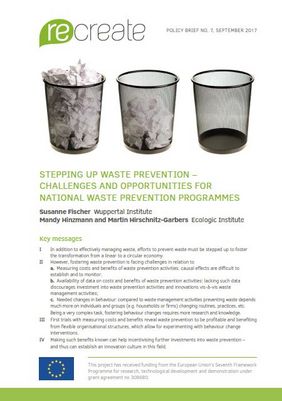Stepping up Waste Prevention – Challenges and Opportunities for National Waste Prevention Programmes

The authors of RECREATE Policy Brief No. 7, among them scientists at Ecologic Institute, explain how the potential of waste prevention can be better realised.
RECREATE Policy Brief No. 7 examines the challenges and opportunities of national waste prevention programmes. The authors state that the political framework needs to be more enabling and with further support for research and development targeted at measuring waste prevention and behavior change to unlock the potential of waste prevention.
Key messages of the policy brief are:
- In addition to effectively managing waste, efforts to prevent waste must be stepped up to foster the transformation from a linear to a circular economy.
- However, fostering waste prevention is facing challenges in relation to
- Measuring costs and benefits of waste prevention activities: causal effects are difficult to establish and to monitor;
- Availability of data on costs and benefits of waste prevention activities: lacking such data discourages investment into waste prevention activities and innovations vis-à-vis waste management activities;
- Needed changes in behaviour: compared to waste management activities preventing waste depends much more on individuals and groups (e.g. households or firms) changing routines, practices, etc. Being a very complex task, fostering behaviour changes requires more research and knowledge.
- First trials with measuring costs and benefits reveal waste prevention to be profitable and benefiting from flexible organisational structures, which allow for experimenting with behaviour change interventions.
- Making such benefits known can help incentivising further investments into waste prevention – and thus can establish an innovation culture in this field.
The RECREATE Policy Brief No. 7 „Stepping up Waste Prevention“ is available for download
Further Links:
- Research Network in Climate, Resource Efficiency and Raw Materials (RECREATE)
- RECREATE project website
- Developing and Evaluating Appropriate Indicators for Monitoring Waste Prevention Measures
- Models, Potentials and Long-Term Scenarios for Resource Efficiency (SimRess)
- Resource Efficient Food and dRink for the Entire Supply cHain (REFRESH)
